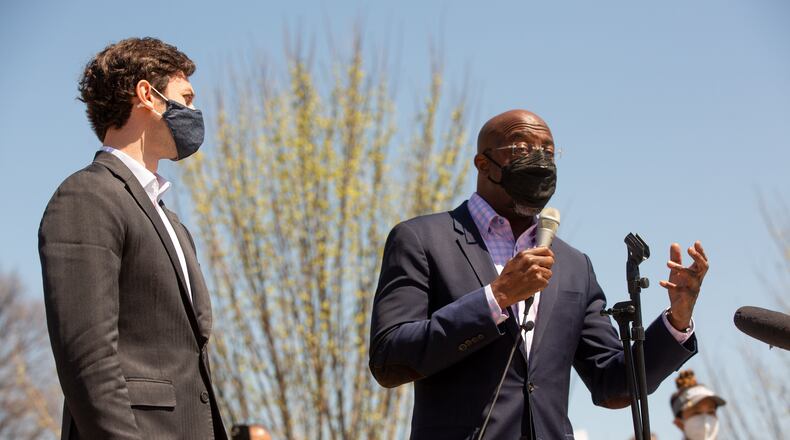Georgia’s two Democratic U.S. senators have tried to entice state Republican leaders to increase access to Medicaid with generous financial incentives. Now they’re pushing a new strategy to press the state to open the program to hundreds of thousands of lower-income Georgians.
Sens. Jon Ossoff and Raphael Warnock penned a letter calling for provisions to “close the coverage gap” in Georgia and other states that have refused to expand Medicaid to be included in any federal legislation that addresses health care and the economy.
“We can no longer wait for states to find a sense of morality and must step in to close the coverage gap and finally ensure that all low- and middle-income Americans have access to quality, affordable health care,” the senators wrote.
Medicaid provides health coverage to low-income and disabled residents, including about 2 million in Georgia. Expanding who is eligible could provide health coverage to more than 480,000 additional people in the state, according to health care analysts.
Georgia Republican leaders have long opposed expanding Medicaid, saying it would be too costly, too inflexible and too dependent on the whims of the federal government. An infusion of about $2 billion to cover the full tab of Medicaid expansion for two years in the $1.9 trillion coronavirus stimulus didn’t win over critics, at least so far.
Ossoff and Warnock said they are developing legislation to work around the state’s objections. Their letter outlined the possibility of a “federal Medicaid look-alike program” run through the Centers for Medicare and Medicaid Services.
The two also said they were investigating “other strategies that would provide coverage to beneficiaries in the coverage gap” so long as the legislation mirrors Medicaid benefits by ensuring there are no premiums and limited cost-sharing.
“Closing the coverage gap and providing more Americans with quality, affordable health care coverage is the most effective policy to reduce racial and ethnic health disparities and would be a major step towards decreasing the high rates of uninsured Americans in non-expansion states,” the two wrote.
‘We have a duty’
It’s not clear how the Democrats in the evenly divided Senate plan to clear a filibuster that takes 60 votes to overcome, though the two could try to insert the language in the $1.7 trillion infrastructure package that’s still in the works.
The letter, addressed to Senate Majority Leader Chuck Schumer and Minority Leader Mitch McConnell, adds a new wrinkle in the political debate over health care policy in Georgia.
Like other Republican leaders, Gov. Brian Kemp has criticized Medicaid expansion. During his 2018 campaign, he promised instead to back what he called an innovative conservative approach to cover more of Georgia’s poor.
Months after he took office, he unveiled a narrowly tailored initiative called Georgia Pathways and Access that would add an estimated 50,000 poor Georgians to the rolls over the course of two years. It included a work or activity requirement to be eligible for coverage.
But the Biden administration earlier this year put Kemp’s proposal on hold indefinitely. And the governor has faced more calls for Georgia to join the 38 states that have already expanded their Medicaid programs as a global health crisis has strained the state’s health care system. In a test vote this year, the Republican-controlled Georgia House voted 98-68 to oppose full expansion.
Under the stimulus measure, states that expanded would have received a 5% boost in their regular federal Medicaid matching rate for two years.
The Kaiser Family Foundation estimates Georgia would net $700 million even after factoring in the costs of financing the expansion.
Kemp’s office remains committed to its plan.
“One-size-fits-all, government-run health care has failed to deliver results for Georgians in need,” Kemp spokesman Cody Hall said. “That’s why Gov. Kemp has continued to advocate for the Georgia Pathways and Access plan that would make health care accessible for the first time to thousands and affordable for millions more.”
Ossoff and Warnock pushed for their plan, which would provide coverage to more Georgians. They framed their proposal as the “most effective policy to reduce racial and ethnic health disparities” that are stressing Georgia’s health care system.
“We have a duty to our constituents and a duty to those suffering from a lack of access to health care to provide for them when they are in need,” the senators wrote.
About the Author
The Latest
Featured




